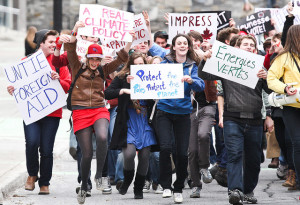First-time compulsory voting is designed to get politicians to engage with young voters’ concerns
This week on Democratic Audit, Matt Henn and Nick Foard argued that introducing compulsory voting would risk increasing the resentment of young people toward politics. In this post we feature a response from Glenn Gottfried and Sarah Birch, who have proposed compulsory voting for first-time voters. They argue this could be an effective tool to help people form the voting habit and to get politicians to listen to the concerns of young people.

Deputy Prime Minister Nick Clegg engaging with young people. Credit: Liberal Democrats, CC BY-ND 2.0
Falling voter turnout in the United Kingdom has been well recorded over the past several decades. But it’s not the decline in overall turnout that should just worry us. A deeper underlying issue is the growing inequality in turnout as younger and poorer citizens are removing themselves from the electoral process at a much faster rate than those who are older and more affluent. This has profound political consequences as politicians tend to respond to the interests of voting groups over non-voting groups which we’ve empirically demonstrated in our report Divided democracy: Political inequality in the UK and why it matters.
When politicians favour the interests of higher turnout groups it unleashes a vicious cycle of disaffection and under-representation of lower turnout groups. As policy becomes less responsive to their interests they’re more likely find that politics has nothing to say to them, thus reducing their motivation to vote. We find that such a radical problem within our democracy requires a radical solution. Our approach to this concern is to make voting compulsory for first-time eligible voters only. The logic behind this proposal is that voting – and non-voting – is habitual. Those who don’t vote at an early age are less likely to pick up the habit of voting later in life.
A common criticism of our proposal for first-time compulsory voting is that it addresses the symptoms rather than the causes of low turnout among young people, and that it may simply breed resentment among the young. This is the conclusion arrived at by several of the authors who have contributed to Beyond the Youth Citizenship Commission: Young People and Politics.
We are very pleased that the idea of first-time compulsory voting is being given serious consideration, but we wonder whether the contributors to this volume have fully taken in the intent of the proposal in our report.
We agree wholeheartedly that on its own, requiring members of a particular group to vote will have virtually no impact on the genuine engagement of that group with politics, and for some it may even be counterproductive. However, that is not how we see this proposal. Granted, young people will, upon achieving the age of electoral majority, be required once – and only once – to attend a polling station, collect a ballot and deposit it in the ballot box (whether they actually vote for a party is entirely up to them as they will have a ‘none of the above’ option).
Clearly if our proposal is explained to young people as “you have to do this, it’s good for you” they certainly may have a strong reaction against it – and understandably so. Instead it must be rationalised within the context of empowerment. It’s not just about changing the minds of young people towards the political process but changing the actions of our politicians as well. First-time compulsory voting will force politicians to cater to the interests of young people who will, under this system, represent a far greater proportion of the total electorate (even if not all first-time voters actually do vote, as Henn and Foard’s data suggest they might not. The ‘compulsory’ aspect of first-time compulsory voting will therefore mainly reside in the fact that it will compel politicians of all stripes to sit up and pay attention to what young people are saying, take account of their needs, and develop policy that caters to those needs.
Older people have been in politicians’ sights in recent years because they vote and politicians know that they vote. Thus politicians across the political spectrum have introduced and maintained policies that benefit the old and disbenefit the young. We have a triple lock on pensions, maintained winter fuel allowances and continued free transport and tax breaks for the old yet there are declining numbers of youth centres, an increase in university fees, while the EMU has been scrapped, and zero-hour contracts for the young. The only way to change this bias in policy-making is to get young people to the polling station. This will compel politicians to pay attention to their collective voice.
Regarding the ‘compulsion’ this represents for young people, it pales in comparison to other mandatory tasks in our lives as citizens, attending school being one of them. The 15 minutes of a person’s life that is typically expended on the task of voting is almost nothing compared to the time that the typical 18-year-old devotes to activities such as: completing application forms for their first job; getting an MOT for their first car; collecting references, bank statements, letters from mum & dad and sundry other documents required to rent their first flat; not to mention registering to vote, which is effectively compulsory in the UK. And if an 18-year-old is particularly time-poor, he or she can always apply for a postal ballot.
It is also worth addressing the reproach that singling out young people as ‘different’ by making them vote would reinforce stereotypes about young people. There are many institutions in contemporary Britain that are age-specific, such as the requirement to receive formal education, eligibility for certain types of insurance, and eligibility to be a magistrate. Moreover, everyone enters the electorate once (including naturalised citizens, who may well not be young), so the proposed institution will in that sense be equitable, once it has been established for a period.
We are not arguing that first-time compulsory voting is a panacea. We believe that it would be best combined with other reforms designed to overcome low political efficacy – including enhanced citizenship education, registering to vote in their school and more accessible polling stations – and other initiatives to raise the profile of young people in politics. But we believe that in addition to increasing demand on the part of young people for representation, it is important to increase the incentives for politicians to supply representation to those young people.
Virtually all those who write about youth participation in politics argue that it is up to politicians to inspire and motivate younger members of the electorate by engaging with their concerns; we completely agree, and first-time compulsory voting is designed to achieve precisely that end.
—
This post is part of a series on youth participation based on the Political Studies Association project, Beyond the Youth Citizenship Commission. For further details, please contact Dr Andy Mycock. An electronic copy of the Beyond the Youth Citizenship Commission: Young People and Politics volume can be downloaded here.
Note: This post represents the views of the author and does not give the position of Democratic or LSE. Please read our comments policy before responding. Shortlink for this post: buff.ly/TB6FC7
—
 |
Glenn Gottfried is Quantitative Research Fellow at the IPPR. Before joining IPPR, Glenn taught statistical analysis in politics and European Union governance at the University of Sheffield, where he earned his PhD investigating regional variations in public attitudes towards European integration. |
 |
Professor Sarah Birch is a Professor of Comparative Politics at Glasgow University. |






 Democratic Audit's core funding is provided by the Joseph Rowntree Charitable Trust. Additional funding is provided by the London School of Economics.
Democratic Audit's core funding is provided by the Joseph Rowntree Charitable Trust. Additional funding is provided by the London School of Economics.
First time voting could ‘get politicians to listen to young people’s concerns’
https://t.co/9GuepgHTR0 @democraticaudit
Thoughts?
Something which is compulsory implies penalties for the miscreants who will not obey the order to attend or who will not be frogmarched to the poling stations. What penalties do you propose and what would you do about the large number who might engage in resistance and refuse to pay fines (and end up in jail or with a criminal record). And have you factored that in to your considerations?
Not just “frogmarched to the polling stations”!
“to attend a polling station, collect a ballot and deposit it in the ballot box (whether they actually vote for a party is entirely up to them as they will have a ‘none of the above’ option)”
Which implies quite an intrusive level of surveillance! I would really resent this – more than being forced “to eat my greens.
Options for resistance are numerous. I think they under-estimate the inventiveness of the resentful – youthful or not. Students (and others) could club together to raise the deposit and nominate “legalise pot”, “sack the bursar”, “condoms for all”, “pirate”, “party party” or even “ban compulsory voting” candidates. Even the old Monster Raving Loonies may benefit. Some of these candidates could get elected – at least to council seats. (And to be fair – we may also see some very serious single issue fringe candidates standing – “impeach Blair” anyone?)
But criminalising people who realise that in most places there is little point in voting – what does that say about the “political elite”? “Let’s not fix the problem with the system, let’s force everyone to conform to the system.” No, civil disobedience is a well-established response to coercion. Take “political action” – stay in bed – then let the electoral police drag you to the polls!
“Instead it must be rationalised within the context of empowerment. It’s not just about changing the minds of young people towards the political process but changing the actions of our politicians as well. First-time compulsory voting will force politicians to cater to the interests of young people”
Politicians, if being really cynical, vote to keep happy those who keep them in office. That at least is the thrust of this article.
Well in most constituencies it is not the electorate that keep MPs in office but the selectorate – their local selection committees. Most constituencies are rotten boroughs that never change hands and most changes of MP are as a result of a selection committee selecting a successor (or sometimes a replacement) for a sitting MP.
Perhaps then we ought to make it compulsory that every young person should join a political party (bit Maoist, but what the heck, we are already talking coercion) and stay in that party until they have served one term on a selection committee.
Outside that, I think that the young (under 40s?) have wised up to the fact that their vote really does not make a ha’pence worth of difference, whilst those who were brought up in a two party system (when possibly the FPTP system was not so corrupting) still vote out of misguided habit.
1st time compulsory voting will get politicians to engage with young voters https://t.co/BP3ekC7c3t @ElectoralCommUK @electoralreform
1st time compulsory voting will get politicians to engage with young voters https://t.co/BP3ekC7c3t @HansardSociety @PolStudiesAssoc
First-time compulsory voting is designed to get politicians to engage with young voters’ concerns https://t.co/BP3ekC7c3t @bycLIVE @UKYP
Glenn Gottfried & Sarah Birch argue 1st time compulsory voting would make politicians engage with young people https://t.co/S9JHHjy23y @IPPR
First-time compulsory voting should get politicians to engage with young voters’ concerns say Gottfried & Birch https://t.co/owRHjsHJgk
First-time compulsory voting is designed to get politicians to engage with young voters’ concerns https://t.co/ge7wiZfqVR
A few points:
It’s true that there would be *a* benefit to compelling all and only young people to vote, insofar as it should lead politicians to respond to their interests more. I’m sure everyone acknowledges this- the problem is that this good may be far outweighed by other harms.
The “habitual” argument in particular seems problematic in a couple of ways. Firstly, it may be that habit only forms in the wild, naturally, when people elect to undertake a task and not when they are required to on one specific, special occasion. Secondly, the as as been noted elsewhere, whatever habitual effect there may be, might well be far outweighed by the dislike of being compelled to do the thing- setting it up forever, as burden, rather than a desirable choice or a right. “Habit” may simply have no effect in the case of the non-voter who is not, neither here not there with regard to voting, but is actively opposed to it. For example, I’m sure that eating meat at an early age may well be associated with developing a habit of meat-eating through life: but it does not follow that compelling dedicated vegans to eat meat will make them more habitually inclined to consume meat in the future.
It is claimed that the proposal “must be rationalised within the context of empowerment,” but it is not clear that this *can* be so. One can avoid explicitly telling young people that they just have to shut up and vote because it’s good for them, but one can’t guarantee that they will receive or endorse the message that it is “empowering.”
There are also relevant disanalogies between compelling all and only young people to vote and the tasks of attending school, applying for jobs, applying for a flat etc.
Voting may be less onerous in terms of time requirement than applying for a job or a flat, but crucially, these two tasks are essentially voluntary. That one is being forced to do something (simply because one is young) is a relevant factor in one’s experience of the demand. Psychological research has shown that choosing to do x is very different in effect from being coerced to do x, (e.g. reactance), in that the latter often leads to a strong aversion to complying. How demanding the requirement to vote is in terms of time is not so much an issue as the experience of the demand, especially whether it is experienced as legitimate or not. If the govt forced every 40 year old to call up their local council once a month, say the word “orange” and then hang up, this might be very undemanding in terms of time and effort, but would (reasonably) be seen as an unacceptable demand and an illegitimate constraint placed on citizen autonomy.
This may be an important difference between age-specific demands like school attendance and voting. (Also note that it is very plausible that compulsory education *is* resented and *does* turn off many young people from the process of education: which is fine if you want them engaged only until the end of compulsory education, but not if the point of compulsory education was to make them more enthusiastic about education subsequently). Compulsory education pre-18 can be seen as more legitimate than compulsory voting at 18, because there is a clear rationale for distributing the burdens of education this way. Before becoming autonomous adults, children need to be taught certain things and most reflective young people can probably acknowledge this rationale, even if they don’t accept it. They can also see that there is good reason not to compel people other (older) than themselves to attend school, because these people have already received their education and need to work (otherwise the whole point of being educated would be invalidated). The exclusive compulsion of young people to vote, conversely, lacks this kind of obvious justification (even if *some* democratic theorists are convinced of the merits of this policy, it is clear that it won’t be uniformly compelling to young people), and moreover, lacks a clear justification for being applied to young people and *not* older people (unlike basic education). Thus it is much more likely to be seen as an unreasonable burden, placed specifically on young people. It is also worth noting that symbolically (and thus potentially in terms of how it is experienced), it is very different to force young people to receive education *prior* to them becoming autonomous adults, to forcing young people who have (seemingly) become autonomous adults, able to vote, to vote. It is not implausible that young people rather value their ‘adult’ status, and dislike the implication that they are ‘children’ who need to be compelled to do things that are for adult citizens a free choice.
How politicians are supposed to ‘inspire’ young people by a compulsory measure is a n add argument. IMO this article is the proverbial wrong-end-of-telescope thinking; it’s predicated on something being wrong with the voters’ behaviour and about how ‘to overcome low political efficacy’. There’s an almost absent consideration of the culpability of the nature of politics in the UK and the politicians operating in it.
I would want only to repeat most of what I said in response to the original piece: There is something fundamentally wrong with politics and the political class when we get to the situation of 60% of an electorate not voting for anyone – and that excludes the steadily growing large number of non-registered potential voters. It will certainly not be attributable in any significant way to voter so-called ‘apathy’ (that is in fact more often than not likely to be an active deliberate decision not to participate – not to legitimise the unpalatable or the unacceptable. I have not yet one comment from a senior UK politician – UKIP included – expressing any concern, still less shame or embarrassment, at their getting into power through such a dissolute and unrepresentative system of politics. Look to yourselves in the political class across the UK, before you stoop to compelling and sanctioning voters – especially when the target is the already suffering ‘young people’ cohort.
First-time compulsory voting is designed to get politicians to engage with young voters’ concerns https://t.co/VD76vke2pW